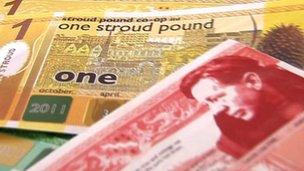Bristol Pound launched to keep trade in the city
- Published

Anti-slavery campaigner Hannah More is on the Bristol tenner
It is a direct assault on global trade. The city of Bristol has launched its own currency, which cannot be used in Bath, never mind Berlin or Bombay.
More than 350 firms in the city have signed up, making it the UK's largest alternative to sterling.
Unlike previous schemes which have relied on paper, the Bristol Pound can be used online, even by mobile phone.
But other local currencies have never really taken off, so can the Bristol scheme really fly?
Local 'locked in'
Ciaran Mundy has been working on the scheme for three years now. To him, this is much more than just a local curiosity.
He said: "If you lock the money into the area, rather than it going into the international finance system then you keep more money actually working in the city here."
The idea is to help local traders by issuing money which customers can only use in their shops. In turn, customers know that the shop must then buy its stock from a local supplier, or pay a 3% fee to convert the Bristol Pound back into sterling.
Bristol has a proud history of independent thinking and, like many cities, there are plenty of shops who claim to use local suppliers. But how do you know? Now if a cafe accepts your payment in Bristol Pound, you know they are either going to buy local or pay the penalty.
There are plenty of cafes, bookstores and shops that sell to the public in the scheme. But organisers have also signed up suppliers, like the natural food wholesaler Essential.
The firm supplies food stores and cafes across the country, and one of the directors, Richard Crooks, said they expect their customers to be using the new currency.
He said: "Quite a few of our customers have been asking us will we be taking the Bristol Pound, when can we start using it, and we've told them 'yes, we can't wait'."
'Too much hassle?'
But just three years ago hopes were equally high up the road in Stroud, Gloucestershire. The Cotswold town has a long history of thinking differently, often ecologically. Many thought the Stroud Pound would provide a feisty challenge to global money markets.
Today though, numbers are down. Just £4,000 was issued in Stroud pounds last year, nearly half the level at the launch.
Several shops told me the scheme was just an accounting nuisance. One baker told me: "People still support us, they just don't use the Stroud Pound to do so, it's too much hassle."
Like many schemes, the Stroud Pound is run by volunteers and it seems enthusiasm is waning.
Bernard Jerman is one of the central people involved, and he says alternative currencies just need people to get behind them.
He told me: "I am a little disappointed because I can see how successful it can be in other places, not particularly the UK, because we have this sceptical attitude to money, but abroad they are transforming local economies."
Alternative currencies have certainly done well abroad. A German currency called the Chiemgauer has been operating in Bavaria since 2003. Last year, 550,000 Chiemgauer were in circulation, with a turnover of 6.2 million. With a 1:1 exchange rate with the Euro, that's serious business.

Laurie Lee is on the Stroud tenner, but circulation is still low
In 2006 a rival to the US Dollar was launched in the Berkshire region of Massachusetts, called the BerkShare. Since then, 2.2 million have been issued and 370 local firms are signed up.
Even at their most idealistic, the Bristol Pound organisers don't expect to rival sterling. But they point out that neither the Germans nor the Americans have online banking or mobile phone payments.
Ciaran Mundy hopes to hit the £6m turnover level soon: "We should reach that next year, and go well beyond it. We're ambitious for the Bristol Pound."
- Published6 February 2012
- Published16 September 2010